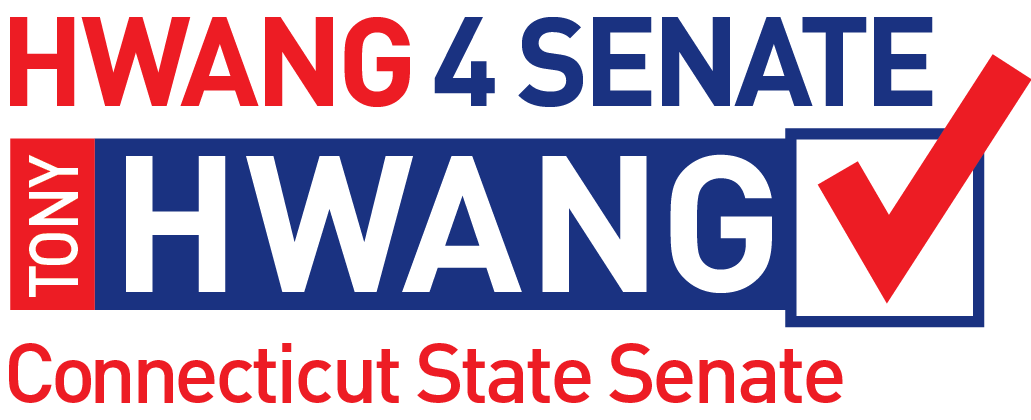State Sen. Tony Hwang can be an expansive speaker about nearly any topic – until he’s asked about his plans to run for governor in 2018.
“I have formed an exploratory (committee),” the Republican lawmaker told the Business Journal. “I’m first and foremost thrilled and honored to represent the 28th district.”
Still, the 52-year-old Hwang, who represents Fairfield, Newtown, Westport, Weston and Easton, described how he’s been visiting all corners of Connecticut, meeting local lawmakers and residents to learn more about issues facing municipalities statewide.
That on-the-road education has informed his involvement with groups like the Coalition Against Casino Expansion in Connecticut. The nonpartisan, 15-group alliance opposes the legalization of a third casino in the state.
The momentum behind that allied opposition began when the Mashantucket Pequot and Mohegan tribes formed a joint venture, MMCT, to explore opening a gambling site in the Hartford area, with Windsor Locks and East Windsor being the leading contenders to land the project. Those tribes respectively operate the Foxwoods Resort Casino in Ledyard and Mohegan Sun in Uncasville.
Hwang said although Connecticut’s original arrangement with the tribes, under which they pay approximately 25 percent of slot machine revenues to the state, had worked well, “The landscape has changed.”
“Over the past years, we’ve seen nearly every state get into the gambling business. We’ve reached an oversaturation point, where the only way to grow that business is to create more addicted gamblers.”
Hwang said that his involvement with the coalition – which includes members of the Connecticut Catholic Public Affairs Conference, the Connecticut Conference of the United Church of Christ, the New England Synod of the Evangelical Lutheran Church in America and the Farmington Valley American Muslim Center – has provided him with innumerable tales of woe and tragedy, including that of one pastor who herself was once a gambling addict.
The senator also decried the high number of suicides and attempted suicides linked to gambling addiction. According to a Georgia State University report, pathological gamblers are five to 10 times more likely to attempt suicide than non-afflicted people. The report also cites Gamblers Anonymous figures stating that 12 to 18 percent of its members have attempted suicide, 45 to 49 percent have made plans to kill themselves, 48 to 70 percent have contemplated suicide and 80 percent have said they “wanted to die.”
Strong stuff, but does it necessarily apply to Fairfield County? Hwang said it does.
“Constitutionally, we are opening the door to creating a precedent,” he said, “with the MGMs of the world wanting to come in.”
Indeed, the tribes once sought to open two casinos in Fairfield County, and last year MGM Resorts International commissioned Oxford Economics to conduct a study of the potential benefits of constructing a new casino off Interstate 95 in southwest Connecticut.
Building one between Bridgeport and Greenwich “would generate far greater economic benefits than locating one in north central Connecticut because southwest Connecticut offers a much deeper market,” the Oxford study said, estimating that such a casino would generate $70 million for the state, as opposed to $16 million from a north central gambling center.
A Bridgeport area casino would cost about$1.1 billion and create more than 5,700 jobs, nearly 2.8 times as many as one in the north central area, according to the study.
The state is also considering a casino in the north central area in order to compete with MGM’s $950 million casino and entertainment complex under construction in Springfield, Massachusetts, just a few miles from the Connecticut border.
Hwang said he understood how appealing are numbers such as those in the Oxford report, especially in the state’s current economic climate. But the potential human cost must outweigh the bottom line, he argued.
He also pointed to Atlantic City, New Jersey as “a bellwether of gambling in the Northeast.” Once a gambling mecca, that city’s casino revenue dove from $5.2 billion in 2006 to $2.9 billion in 2013.
Last month, New Jersey state regulators released figures showing that Atlantic City’s casinos took in $2.6 billion in 2016, an increase of 1.5 percent from 2015, but noted that the increase was due mostly to internet gambling. Over the past three years, five casinos have closed and 11,000 jobs have been lost in the city.
“This is a Fairfield County issue because it’s something that impacts all of our communities,” Hwang said.
Housing law reform
Hwang said another of his priorities this legislative session is tied to his recent appointment as co-chairman of the legislature’s Housing Committee, alongside two fellow Democrats, Rep. Larry Butler and Sen. Gayle Slossberg. In particular, he wants to revisit the often-controversial community and workforce housing statute 8-30g.
Hwang said the law, enacted in 1990 to provide affordable housing, has been repeatedly abused by developers to bypass local zoning laws.
“Our priority is to ensure that every individual in the state has the opportunity to have a roof over his or her head,” he said. “The problem (with the statute) is that it has become a tool for potentially predatory development practices.”
Such developers, he said, can come into a community and propose multiple-unit buildings in any area that qualifies, regardless of the historical character of a given neighborhood or the wishes of existing residents or zoning restrictions. When such cases go to court, the developers typically win approval.
“It’s not simply a NIMBY issue,” Hwang said, referring to the not-in-my-backyard opposition to proposed developments often mounted by community residents. “It’s being used as a hammer to drive nails into communities without any degree of local input.”
While 8-30g’s aims are admirable, its implementation has often been “ill-fated and ill-advised,” Hwang said. He said he plans to call for input from local zoning officials, community leaders and others to create a more flexible law while simultaneously maintaining the objective of creating sufficient affordable housing.
Even in a state facing a nearly $3 billion deficit over the next two years, Hwang said he believed this to be “an exciting time” to be a legislator. “For the first time since 1893, we have a tie in the Senate,” he said, referring to the body’s new makeup of 18 Republicans and 18 Democrats. He said he believes that rather than descending into partisan rancor, such an arrangement will give rise to a new era of bipartisan cooperation, especially when it comes to the budget.
“We need to understand that we don’t have a revenue problem,” he said. “We have a spending discipline problem. A lot of us, including myself, will be watching the governor to see if he has the courage to get us away from business as usual and to economic stability.”

